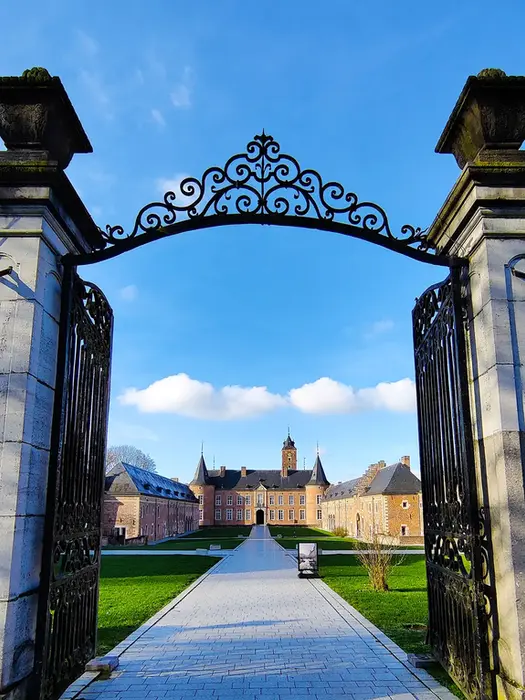
DOMAIN
Unique heritage in the Limburg landscape
The Land Commandery of Alden Biesen offers many advantages. The geometric shapes of our French Garden, the playfulness of the English Park, the unique architecture of the moated castle and outer bailey, and the majesty of the church. Discover the Alden Biesen Land Commandery domain here.
DISCOVER

A romantic landscape full of surprises
Discover the English Park, laid out in 1786 by Land Commander Frans von Reischach and designed by Ghislaine-Joseph Henry. Playful paths, an artificial river, and striking follies like the Roman Temple of Minerva and the Belvedere make it the perfect place for a relaxing stroll.
English Park

Clean lines and regal elegance
The French Gardens of Alden Biesen showcase the beauty of geometric landscaping, inspired by Versailles. Here you'll find perfectly trimmed hedges, the unique Alden Biesen rose, and Mediterranean citrus trees in spring and summer, giving the gardens a unique flair.
French Gardens

From late Baroque residence to DOMUS museum
Originally built in the 16th century and rebuilt in the 18th century, the moated castle has been open to the public as the DOMUS museum since 2025. Classical interior elements, majestic rooms, and a rich history make it the most impressive building of the domain.
Moated castle
English Park
The English Park was laid out in 1786 by Land Commander Frans von Reischach and designed by Ghislaine-Joseph Henry, who was responsible for the expansion of the Royal Palace in Brussels, among other projects. The collection of playful paths forms a counterpart to the French Garden. Characteristic elements include an artificial river and other follies, including the impressive bowling green with the Roman Minerva Temple and grotto, a Belvedere, and a prairie garden. It's the ideal location for a stroll.
French Gardens
The Orangery Garden and the Land Commander's Garden are beautiful examples of the typical geometric garden design found at Versailles. Straight lines and trimmed hedges are the central themes here. You can also find the unique Alden Biesen rose here.
During the spring and summer months you can also find Mediterranean citrus trees here that fit perfectly within the geometric shapes.
Orchards
Alden Biesen is Flanders' premier high-stem orchard. The landscape surrounding the Land Commandery is one of the few places in Flanders where the typical high-stem orchard landscape has remained intact.
Today there are more than 40 hectares of standard fruit orchards and more than 500 unique varieties, some of which can only be found at Alden Biesen.
The orchard is organically managed, and in spring, the blossoms are a real eye-catcher in the region. By late September, the orchard is in full bloom, and some of the fruit is harvested. This project is co-supported by the National Orchard Foundation and the Agency for Nature and Forests.
The blossoming season is an annual highlight and the perfect time to visit.
FORECOURT
The Forecourt is the entrance to the moated castle. You enter through the large gate and are immediately confronted with our moated castle, but don't forget to look left and right. On the right, you'll find the Tithe Barn, and on the left, the Riding School. These buildings also house 30 comfortable bedrooms for conference attendees.
Moated castle
The moated castle was built in the 16th century and converted into a late-Baroque residential castle during the 18th century. After a fire in 1971, it sustained significant damage and underwent major renovations. Since the summer of 2025, the moated castle has been open to visitors as the DOMUS museum . The moated castle is also used for a wide range of activities, ranging from exhibitions and meetings to even serving as a residence for St. Nicholas.
The interior has been restored in recent years with classical elements inspired by the history of the Alden Biesen Land Commandery.
Outer courtyard
The outer courtyard is primarily characterised by the presence of the church. It all began with the church for the Land Commandery. Over 800 years ago, a chapel stood here, and over the centuries, the church evolved into the Baroque masterpiece it is today. The tenant's barn is also located in the outer courtyard.












































